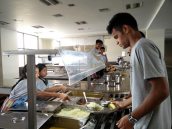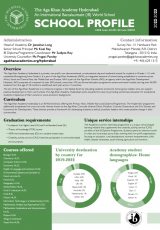MYP Saturday school – highlighting experiential and service learning
Since the start of the Academy year, grades 6–10 have encountered an appealing mix of educational field trips and a variety of activities centred on service learning to align with the Academy's mission to graduate students who are "empowered as stewards to make a positive contribution in a changing world." Below are a few snippets of what they’ve been up to for the past few Saturdays!
Grade 6
 This year, students chose to live by the motto ‘service begins at home,’ with initiatives in our Academy commons and dining hall to spread awareness about the importance of not wasting food or water, promoting health and hygiene, and communicating gratitude for what we have.
This year, students chose to live by the motto ‘service begins at home,’ with initiatives in our Academy commons and dining hall to spread awareness about the importance of not wasting food or water, promoting health and hygiene, and communicating gratitude for what we have.
They have made placards with slogans such as ‘Think-Eat-Save. Reduce your food print’; ‘Waste Less, Want Less’; ‘You have two hands. One for helping yourself and the other for helping others’, ‘Bless the food. Thank the chef.’
Accompanied by drum beats, chants and street theatre, these ambassadors have managed to create a festive atmosphere while holding their placards and communicating thoughtful messages to other students during their lunch hour.
Grade 7
In line with a continued focus on local outreach and building relations with surrounding communities, grade 7 students have visited a government school in Kongarkala Village recently. Here they interacted with students, built trust, discovered issues they faced and came up with plans to assist them. Below is an excerpt from one student’s reflective essay:
 “When our school went there, we asked a student who studied over there what they used the projector for. They answered – ‘for watching cartoons’. So we thought of collecting short videos in Telugu which could teach them about alphabets and numbers and simple fruits and vegetables. We could buy them some educational CDs and give it to them so that their concepts do not go wrong and they learn their lessons properly and get an experience of the type of learning in which we learn, which is digital. Some students did not have appropriate foot wear for playing on their muddy, stony school ground so they get hurt very easily. So we are planning to donate them some old shoes which are small for us and appropriate for playing on that kind of ground.”
“When our school went there, we asked a student who studied over there what they used the projector for. They answered – ‘for watching cartoons’. So we thought of collecting short videos in Telugu which could teach them about alphabets and numbers and simple fruits and vegetables. We could buy them some educational CDs and give it to them so that their concepts do not go wrong and they learn their lessons properly and get an experience of the type of learning in which we learn, which is digital. Some students did not have appropriate foot wear for playing on their muddy, stony school ground so they get hurt very easily. So we are planning to donate them some old shoes which are small for us and appropriate for playing on that kind of ground.”
– Kais Vasaya: Grade 7A
Grade 8
The Aga Khan Academy Curricular Strands are areas of learning aimed specifically at developing knowledge, skills and attitudes required by future leaders and an important part of our founder’s vision for changing tomorrow’s outcomes in the developing world. Grade 8 students have visited the Chowmahalla Palace in Hyderabad Old City to gain a deeper understanding of two strands: Cultures (including Islamic culture) and Economics for Development.
The splendid Chowmahalla Palace was once the seat of the Asaf Jahi dynasty where the Nizams of Hyderabad hosted their official guests and royal visitors. Although it is over 200 years old, their palace has been carefully restored and preserved in all its beauty and elegance. Students toured the palace and analysed the synthesis of several architectural styles and influences, while being informed about the Nawabi way of life and the way they ruled their state.
During Nizam rule, Hyderabad was viewed as a state with a secular outlook that enjoyed communal harmony. Its rulers were renowned for their focus on economic development and the progression of the poor, as well as protection of the disenfranchised. Its administration was ostensibly excellent, and achieved several iconic milestones such as the development of the railway and introduction of electricity. By 1947, Hyderabad was the largest and most prosperous of all princely states in India.
Grades 9 and 10
Grade 10 students have been engaged in sessions exploring the significance of service learning and how it impacts the life of both server and beneficiary. Through group discussions and activities, they have investigated the difference between development, charity and aid. Students have also reflected on their previous service and action activities to draw useful learnings through SWOT – a framework for assessing relative Strengths, Weaknesses, Opportunities and Threats. The AKDN (Aga Khan Development Network) model for community development, MIAD (Multi-Input Area Development) was further examined. Ultimately, students came away with an understanding of the significance and bidirectional nature of service learning, that should profoundly impact both giver and receiver.
Students from both grades visited Pochampally village to put their learning into practice, some 25 kilometres from Hyderabad. This village has developed socially and economically through textiles and tourism, so students were able to tour their handicraft village and market centre. They were able to interact with different people involved with the Pochampally handicraft and tourism industry, and conducted surveys to discover the extent of aid being provided to local craftsmen. Reflections on their visit included suggested solutions to improving the lives of the Pochampally community, through raising the profile of the village as a textile tourist centre and increasing market access and linkages for the produced textiles.





